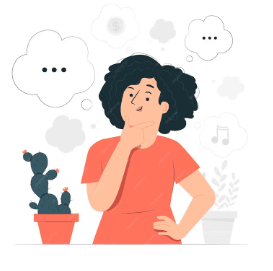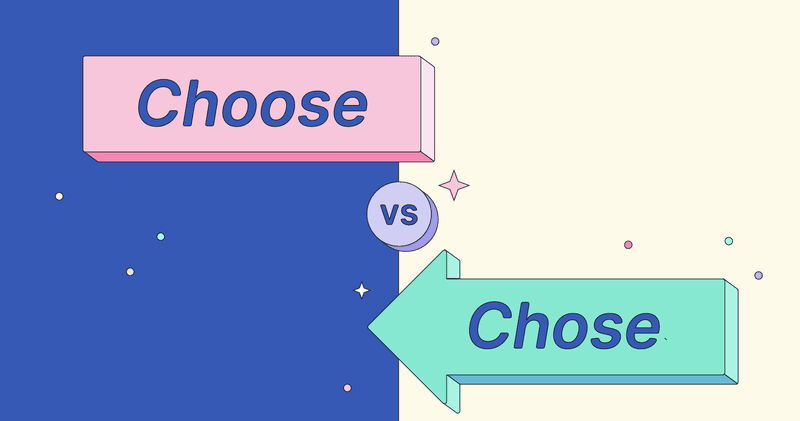Chose or Choose? Selecting the Correct Verb in Grammar
Contents

Imagine Ravi, an Indian professional, giving a presentation at an international conference. He mistakenly says, "We choose to implement the strategy last quarter," confusing his colleagues. This mix-up between 'chose' and 'choose' is common for non-native English speakers and can affect career growth. It's important to know how to use 'chose' vs 'choose' correctly for clear communication.
This blog post will explain what these words mean, show how to use them with examples, teach the chose vs choose pronunciation, and point out common errors.
What is the Definition of Chose and Choose?
Let's first understand the chose vs choose meaning.
'Chose' and 'choose' are common words in English that often confuse non-native speakers. However, understanding the chose vs choose definition can greatly improve your proficiency.
'Chose' is the past tense of 'choose', meaning it describes an action completed in the past. For instance, "I chose a blue shirt yesterday."
'Choose' is the present tense, used when discussing current or future actions. For example, "You can choose your dessert now."
Term | Tense | Example |
Chose | Past Tense | "Yesterday, Ravi chose to walk instead of taking a bus." |
Choose | Present Tense | "You can either choose to work or play right now." |
Improving your vocabulary can be easy if you know synonyms for words.
Synonyms for 'Chose':
Selected
Picked
Decided
Synonyms for 'Choose':
Pick
Select
Decide
How to Pronounce Chose vs Choose?
English vowel sounds can be tricky, especially for Indian learners. Here's an easy explanation to help you out:
"Chose" - The phonetic transcription is /tʃəʊz/. The 'o' in 'chose' sounds similar to the 'o' in words like 'go' or 'so'. That's the long 'o' sound. The final 'e' is silent.
"Choose" - Phonetic transcription for this word is /tʃu:z/. The word has a slightly elongated 'oo' sound, like in words such as 'shoe' or 'boo'. Again, the ending ‘e’ isn't pronounced.
Focusing on vowel sounds can make a big difference in your pronunciation of these words.
How to Properly Use Chose vs Choose?
Understanding when to use 'chose' and 'choose' is often confusing for English learners in India. Let's explore some scenarios where these terms might be incorrectly used:
At Work: If you're telling your colleague about a task you've selected for today, it's incorrect to say, "I chose to work on the report today." Instead, you should say, "I choose to work on the report today", as this refers to a present-tense decision.
Social Settings: Perhaps you're sharing with friends about your plans for dinner. It would be wrong to say, "I choose biryani yesterday". The correct sentence should be, "I chose biryani yesterday", as it refers to a past-tense decision.
Common Mistakes When Using Chose vs Choose

When it comes to 'chose' and 'choose', many English learners in India often get confused. The words sound similar but have different meanings and usages. Here are some common mistakes and their corrections:
Common Mistake | Correction |
I choose to go to the movies yesterday. | I chose to go to the movies yesterday. |
I will choose a book for bedtime last night. | I chose a book for bedtime last night. |
Remember, 'choose' is a present tense verb, used when talking about a decision you're making now or in the future. Meanwhile, 'chose' is a past tense verb that refers to a decision made in the past.
To avoid these mistakes while using chose vs choose in a sentence:
1. Always consider the time frame of your sentence before choosing between 'chose' and 'choose'.
2. Practice using both words in sentences.
3. Review your sentences for proper tenses.
How to Practice Chose vs Choose
Here are some activities to help you master these words:
Quizzes: Online quizzes are interactive ways to learn. Try quizzes on 'chose' vs 'choose' and check your understanding.
Flashcards: Design flashcards using chose vs choose in a sentence. Challenge yourself by guessing the correct word before turning over the card.
Daily Notes: Use these words in your day-to-day communication. Keep a journal and note down instances where you used them correctly and incorrectly.
Learning with Clapingo can further help your English learning journey. You can join the Clapingo Practice Club to practice difficult words and phrases in a supportive environment.
To Sum Up
To sum up, knowing when to use 'chose' and 'choose' is important for clear professional communication.
'Chose' is used for decisions in the past ("I chose a career in finance"), while 'choose' is for current or future decisions ("You need to choose your words carefully"). Mixing them up is a common mistake, even for those who know the chose vs choose definition. Also, remember how they sound: 'chose' rhymes with 'nose', and 'choose' with 'lose'.
Using these words correctly shows your command of English in professional settings. To get better, read our blog posts and practice speaking. If you want to improve your English, check out Clapingo for courses designed for non-native speakers in India. Explore our offerings now!
FAQs
1. What is the difference between 'chose' and 'choose' meaning?
The difference between chose vs choose meaning is that 'choose' is used to express a decision made in the past. For example, "I chose to learn English with Clapingo." And, 'choose' is used when deciding on the present or future. For instance, "You can choose to improve your English skills at any time."
2. Can you give me an example of how to use 'chose' and 'choose'?
Here are the examples for 'chose' and 'choose':
Present/Future: "I can't decide whether I should choose the red sari or the blue one for my cousin's wedding."
Past: "For my last job interview, I chose to wear a formal suit."
3. Is it important to understand the difference between 'chose' and 'choose'?
Yes, understanding this difference allows you to accurately yourself in different time contexts. It can make your spoken English clearer and more precise.
Comments
Your comment has been submitted